Advocate Trauma Recovery Center at Chicago area hospitals helping victims of violent crimes recover

Advocate Trauma Recovery Center at local hospitals helping victims of violent crimes recover
The Advocate Trauma Recovery Center, which is now embedded in three Chicago area hospitals, is helping people recover, even after their physical wounds are healed.
OAK LAWN, Ill. - A trauma recovery center is helping victims of violent crimes put their lives back together.
The Advocate Trauma Recovery Center, which is now embedded in three Chicago area hospitals, is helping people recover, even after their physical wounds are healed.
Paul Robinson, 33, was playing with his son in Morgan Park in 2017 when a stray bullet severed his spinal cord, paralyzing him from the chest down.
"Just a car shooting, and it sped away. That's when I got hit and fell," said Robinson.
Even after months of physical recovery, Robinson continued to slide into depression.
"I knew I needed to seek professional help beyond talking to family and friends," said Robinson.
Now, Robinson is putting his life back together with help from the Advocate Trauma Recovery Center — which opened four years ago at Christ Hospital in Oak Lawn.
SUBSCRIBE TO FOX 32 ON YOUTUBE
"We provide free services of group therapy, individual therapy, psychiatric services and extensive social services," said Dr. Kim Miiller, Director of the Trauma Recovery Center. "And so it's really a one-stop shop for anybody who has been impacted by this intentional crime."
The idea behind the program is to help victims of violent crime by getting their lives back on track by finding them a place to live, a job or financial and legal resources.

In Robinson's case, the trauma recovery team helped him get a specially-fitted car, so that he could continue caring for his son.
His therapist even suggested he get a cat.
"There's help out there," said Robinson. "There's people going through what you're going through. You're not alone out there."
There are now two Advocate Trauma Recovery Centers in the Chicago area, serving three Level 1 trauma centers.
In 2021, they provided services for about 1500 patients.
Because many of the violent crime victims are gang members, the center also employs outreach workers to defuse retaliation.
"We want to be able to get in there and be able to calm the patient down, have this patient re-think about this event, and it not escalating," said Outreach Supervisor Don Wardlow.

